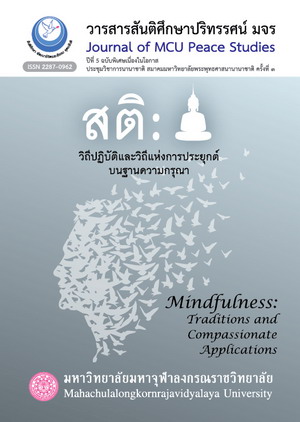An Application of Buddhist Peaceful Means to Mediation: A Case Study of the Mediators of Mediation Center, Legal Execution Department
Main Article Content
บทคัดย่อ
This thesis in the form of a qualitative research done by the tools of documentary study and an in-depth interview with 7 key informants, is of 3 objectives: (1) to study theconceptual idea of mediation according to Buddhist peaceful means, (2) to study mediation context of Mediation Center’s mediators, Legal Execution Department, and (3) to study the application of Buddhist peaceful means to mediation of the mediators of Mediation Center, Legal Execution Department.
From the research, it is found the followings:
1) Mediation is the useful compromise to litigants and the process of judgement leading to the end of the prosecution with fastness, saving timeand with satisfaction of the litigants, including relationship keeping. In the dimension of Buddhism, it is found that the Buddha had used the means of mediation as a part of conflict resolution and held on to various levels of proceedings, one of them was Brahmavihara: The Four Sublimes States of mind are merciful, Please, sympathetic joy and Detached
2) Mediators must have love, good will, Be attentive, paying for debt is a burden Expressing gladness for his happiness. And ethical morality in performing their tasks without taking side, be free, not discriminating and not allow to be influenced by the outside persons that will cause the loss of neutrality. Mediators should assist, support litigants to make decisions on their own under the base of enough information in finishing the dispute willingly; they must not order, make decisions or arbitrate any dispute, including not trying to persuade or force litigants to agree with their opinions.
Article Details
ทัศนะและความคิดเห็นที่ปรากฏในบทความในวารสาร ถือเป็นความรับผิดชอบของผู้เขียนบทความนั้น และไม่ถือเป็นทัศนะและความรับผิดชอบของกองบรรณาธิการ ยินยอมว่าบทความเป็นลิขสิทธิ์ของวารสาร
เอกสารอ้างอิง
Phramatha Hansa Dhammahaso.(2011) Buddhist Peacful Means:Intergrating the Principles Tools,Manage Conflicts.BKK:21 Century.
Mediation Center Legal Execution Department,Mediation.BKK:MPP.
Phamaha Uten Panyaparitat,(2527)Thai Tipitakas New.BKK:Phayoonsanthaikanpim.


